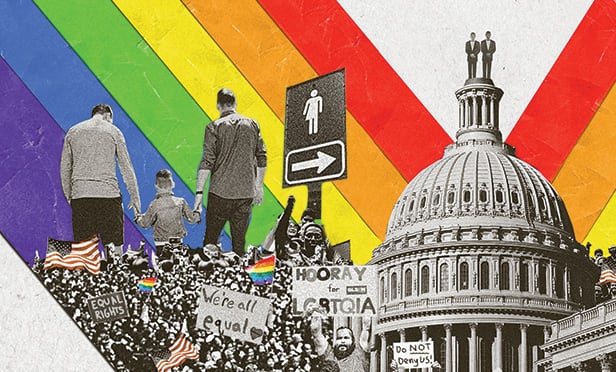 Approach retirement as smartly as you approach anychallenge in life. (Photo: Shutterstock)
Approach retirement as smartly as you approach anychallenge in life. (Photo: Shutterstock)
The LGBT community has always faced uniquechallenges—physical, emotional and financial. And despite the factthat the Defense of Marriage Act was struck down, there are stillplenty of legal obstacles for transgender, lesbian and gay couples—some of them surfacing just in timefor retirement.
|According to SAGE, a nonprofit group focusing on improving thelives of older LGBT people, 51 percent of older LGBT people areworried they won't have enough money as they age, compared with 36percent of the general population. In addition, more than 40percent of the older LGBT community fears outliving retirementsavings and are “very worried” that they'll have to work beyondretirement age; just a quarter of non-LGBT people are comparablyconcerned.
|Those fears are based on fact. An analysis of the FederalReserve's Survey of Consumer Finances by the AP-NORC Center forPublic Affairs Research finds that same-sex couples have medianretirement savings of just $66,000; that's 25 percent less thanopposite-sex couples, at $88,000.
|And that's not all; whether LGBT boomers are married or not,they're less likely to be able to save for retirement thanks todiscrimination in hiring and wages.
|California-based think tank the Williams Institute finds that the wage gapbetween gay and heterosexual men goes as high as 32 percent. And a2013 Pew Research study as well as a 2012 Gallup study found thatLGBT individuals were more likely to make less money than theirstraight peers during their careers.
|LGBT workers, according to an AP report, have faced higherunemployment, lower wages and workplace discrimination despitenondiscrimination policies that now exist in many corporations. TheAmerican Civil Liberties Union reports that “By the close of 2016, 20 states plus DC banneddiscrimination based on sexual orientation and gender identity orexpression in employment, housing, and public accommodations, andan additional three states provided incomplete statewidenondiscrimination protections.”
|But that leaves 27 states where discrimination persists—andwhere it is still legal to fire someone for their sexualorientation.
|So LGBT seniors older than 65 are more likely to end up inpoverty, with the Gallup poll finding that 15.9 percent of gay menolder than 65 were near or below the federal poverty line, comparedwith 9.7 percent of heterosexual men in the same age group. And a2009 report by the Williams Institute showed lesbian couples olderthan 65 were twice as likely to live below the poverty line asopposite-sex couples.
|Here are 10 rules you should follow in putting together aretirement plan that will help you and your significant other avoidturbulence on the lazy (or not) river of retirement. Some sourcesinclude Nerdwallet, New York Life, the Huffington Post, Forbes and the Associated Press, as well as the SocialSecurity Administration and SAGE.
|Since there's such a hodgepodge of regulations and laws acrossthe country, as well as gaps in protections even in LGBT-friendlyareas, make sure to check for the most up-to-date information asyou get closer to retirement. Here are the 10 tips:
|10. Update any wills.
Well, no, strictly speaking wills fall under estate planning,but if you're half of a couple, you'll want to be sure that anyfunds/property you have to leave go to the person you want to havethem, or their retirement could be in jeopardy.
|And in some states, laws are not written so that a same-sexspouse or a domestic partner automatically inherits—for instance, ahouse that's not in both names. If one of you dies, the other couldend up homeless.
|9. Make sure beneficiary and other designations are donecarefully.
Just because you have a 401(k) at work doesn't mean that themoney will automatically go to your spouse—in fact, many LGBT folksare hesitant to put down a same-sex partner's name as a designatedbeneficiary lest it cost them their jobs.
|And companies in states where rights are not protected maychoose not to honor such designations.
|For insurance policies, you must also make sure that therelationship is recognized—particularly in the case of suchproducts as long-term care policies bought together. And don'tforget medical powers of attorney, so that you can handle medicalproblems for your spouse without hassle.
|8. Research Social Security benefits.
While same-sex couples are now entitled to Social Securitybenefits, the actual issue of whether and how their union has beenlegalized (or not) can affect which benefits a spouse is eligiblefor.
|A marriage, rather than a domestic partnership or other suchunion, could affect whether higher benefits are available, orwhether family members might be entitled to disability benefits orsurvivor benefits.
|7. Try to save more.
Considering the plight of LGBT people who have not saved enough(or made enough), you might want to explore ways to boost yoursavings.
|6. Try to work longer.
Sticking with a job longer can help you increase your retirementsavings; so can taking on a second job or gig work. The longer youcan stay on a payroll, or find an alternate source of income, thelonger your retirement money will last.
|5. Try to find a better job.
If at all possible, look for a job with better pay andbenefits—and in a location where those are protected by law. Ahigher income and better access to a retirement plan, perhaps withmore matching funds, will make life easier as you age.
|4. Beware of the state or town where you live.
Although many states and communities have passed legislation toprotect the LGBT community, others have gone in the oppositedirection.
|Choose carefully when it comes to a retirement destination,because an unfriendly milieu could endanger all you've worked forall your lives—even if not posing a physical danger, by imposingisolation or condoning casual mistreatment by businesses oremployers, or even in other ways that perhaps were not ofimportance until retirement.
|Sadly, discrimination still exists; if possible, don't putyourselves in the way of any more of it than necessary.
|Conversely, you and your spouse may be eligible for tax benefitsin LGBT-friendly states, but you'll need to be sure thateligibility extends to both (such as a widow's/widower's break onproperty taxes or a reduction for military service).
|3. Choose your retirement neighborhood with care.
To avoid discriminatory treatment in housing that could resultin isolation during retirement—a time during which seniors can beat risk for depression and even health problems if they feel cutoff from their communities—give serious thought to whether yourcurrent home is where you want or need to stay.
|Downsizing to save money and moving to a hostile area could endup costing you more than if you stay put.
|2. Thoroughly investigate assisted living/care facilities.
According to an American Bar Association article, “LGBT seniors can be denied admissionto nursing homes and assisted living and independent livingcommunities because of their sexual orientation or genderidentity.”
|And even if that changes, discrimination is common in seniorhousing against LGBT seniors, according to a PBS report.
|So if you or your spouse need to move into a facility thatoffers assistance with household or health issues that are beyondyour control, make sure that the facility is LGBT-friendly. Suchplaces are becoming more common, and the support you'll find bybeing in a place where you do not have to hide where you are—orwhere you might actually fear living—is, as the saying goes,priceless.
|1. Build a support system now.
LGBT people often have a far smaller network of support than thepopulation at large, with many cut off from disapproving familymembers or having smaller families without children—or being aloneafter widowhood or divorce.
|Well in advance of retirement, look for a congenial group offriends that share common interests in the hobbies and activitiesyou love, and with whom you can act as a community to help eachother in various ways.
|Then you'll have a ready network of people with whom you cantrade assistance and moral support when it's needed—the way familymight support the general population.
Complete your profile to continue reading and get FREE access to BenefitsPRO, part of your ALM digital membership.
Your access to unlimited BenefitsPRO content isn’t changing.
Once you are an ALM digital member, you’ll receive:
- Critical BenefitsPRO information including cutting edge post-reform success strategies, access to educational webcasts and videos, resources from industry leaders, and informative Newsletters.
- Exclusive discounts on ALM, BenefitsPRO magazine and BenefitsPRO.com events
- Access to other award-winning ALM websites including ThinkAdvisor.com and Law.com
Already have an account? Sign In










